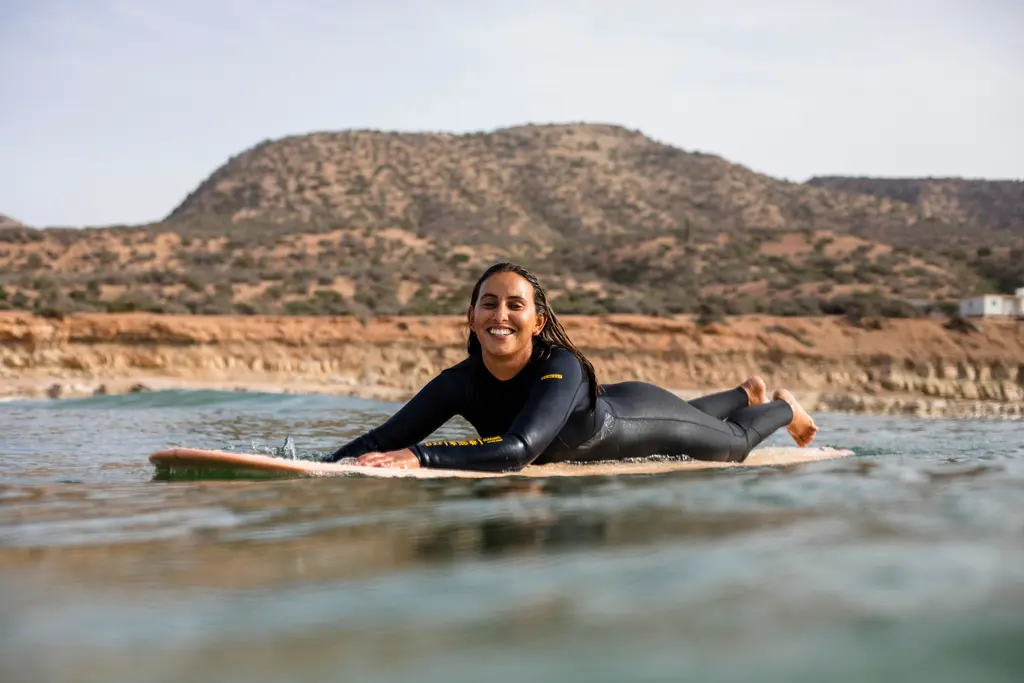Could the sea be destroying surfer’s immune systems?
- Text by Mara Johnson-Groh
- Photography by Mike Sutherland via Flickr

In a day spent out on the waves, it’s nearly impossible not to swallow a mouthful of water – and while these salty gulps aren’t going to kill you, they may be laden with more than meets the eye. According to worrying new research, surfers are three times more likely to host antibiotic resistant bacteria in their guts than non-surfers, leaving them more susceptible to diseases that can no longer be treated with antibiotics.
Since they were first discovered in 1928, antibiotics have been used to kill bacterial infections like pneumonia, tuberculosis and other fatal diseases. Unfortunately, though, bacteria are highly adaptable, and can quickly develop immunities. The widespread use of antibiotics in medicine today worries the World Health Organisation and the UN environmental assembly, who both believe we may be entering an era where they will become ineffective against basic diseases. A study in 2016 estimated that given current trends, once preventable antibiotic-resistant diseases could kill 10 million people annually by 2050.
So what does this mean for the surfing community? Studying samples given by surfers and researchers at the University of Exeter Medical School identified E. coli bacteria resistant to cefotaxime – a commonly used antibiotic – present in nine per cent of surfers’ guts. This is much higher than the land-borne standard of three per cent.
The researchers also found surfers’ guts four times more likely to host bacteria with genes susceptible to antibiotic resistance. These bacteria could intermix with other bacteria, potentially creating new types of antibiotic-resistant bacteria.
“We expected to see a difference between surfers and people who do not go in the water because previous research had shown that surfers are swallowing a lot of seawater, which contains antibiotic-resistant bacteria,” Anne Leonard, research fellow at the University of Exeter Medical School and lead author on the study, tells Huck. “However, I think it’s fair to say we didn’t expect to observe such a large increase in risk and were surprised.”
Over the last 30 years, water pollution around the coastal UK has vastly improved, due in part to groups like Surfers Against Sewage who organise cleanup events and educate beach-goers. However, manure from animals treated with antibiotics is widely used to fertilise fields and the runoff eventually makes its way to the sea. Unfortunately, this type of pollution is much harder to clean up.
Surfers aren’t uniquely at risk of ingesting antibiotic-resistant bacteria — such bacteria have also been found in ready-to-eat foods like fresh produce and dairy products. And despite the increased risk to surfers, who swallow on average 10 times more seawater than swimmers, experts familiar with the research don’t see a need to discourage people from spending time in the ocean.
“While this research highlights an emerging threat to surfers and bodyboarders in the UK it should not prevent people from heading to our coasts,” explains David Smith, science and policy officer for Surfers Against Sewage. “We would always recommend water users check the Safer Seas Service before heading to the sea to avoid any pollution incidents and ensure the best possible experience in the UK’s coastal waters.”
The results from this study will help scientists better understand how antibiotic-resistant bacteria circulates among humans and in the natural environment. Understanding this connection may be key to developing a strategy to contain the spread of antibiotic-resistant bacteria around the world. While the results are troubling, they shouldn’t keep surfers from their passion and Leonard is continuing with her research into antibiotic-resistant bacteria in coastal waters.
“Further research needs to be done to look at the long-term health effects of carrying resistant bacteria in the guts of surfers, who are generally fit and healthy, and their immune systems are able to keep infections at bay without needing to resort to antibiotics,” she adds.
Enjoyed this article? Like Huck on Facebook or follow us on Twitter.
You might like

Maryam El Gardoum is breaking new shores for Morocco’s indigenous surfers
The Amazigh Atlantic — Through her groundbreaking career and popular surf school, the five-time Moroccan champion is helping women find their places in the waves.
Written by: Sam Haddad

Volcom teams up with Bob Mollema for the latest in its Featured Artist Series
True to This — The boardsports lifestyle brand will host an art show in Biarritz to celebrate the Dutch illustrators’ second capsule collection.
Written by: Huck

A new documentary spotlights Ecuador’s women surfers fighting climate change
Ceibo — Co-directed by Maddie Meddings and Lucy Small, the film focuses on the work and story of Pacha Light, a wave rider who lived off-grid before reconnecting with her country’s activist heritage.
Written by: Hannah Bentley

The rebellious roots of Cornwall’s surfing scene
100 years of waveriding — Despite past attempts to ban the sport from beaches, surfers have remained as integral, conservationist presences in England’s southwestern tip. A new exhibition in Falmouth traces its long history in the area.
Written by: Ella Glossop

Clubbing is good for your health, according to neuroscientists
We Become One — A new documentary explores the positive effects that dance music and shared musical experiences can have on the human brain.
Written by: Zahra Onsori

In Queens, local surfers are moulding a neighbourhood in their own renegade images
Rockaway breaks — On a little-known stretch of beach in eastern New York City, an ecosystem of wave catchers, and the local bars and restaurants that fuel them, is seeing a boom. Paolo Bicchieri meets the residents and business owners behind the growing swell.
Written by: Paolo Bicchieri